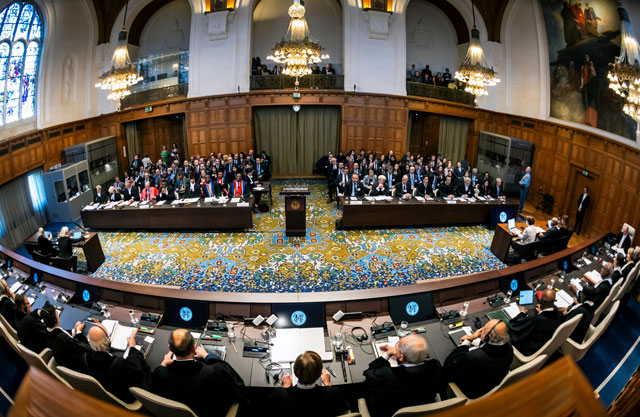
Putting history of Israel as a nation state into context
COMMENT | NAYEBARE KARUHANGA | In attempting to clarify the dissenting opinion of Justice Julia Sebutinde in the Application of the Convention on the Prevention and Punishment of the Crime of Genocide in the Gaza Strip (South Africa v. Israel), I explained in Part 1 why I believe she has been wrongly criticized and misinterpreted by many members of the public. In this Part 2, I found it necessary to put history touching Israel as a nation state into context so that we can understand better the existing conflict with the Palestinians.
We will continue to make mistakes if our view of Israel’s history starts from the Balfour Declaration of 1917 or the declaration of independence of Israel in 1948 and we lose sight of the rich and incontrovertible history of more than 4 millennia prior to that. Listening to the media nationally and globally, l cannot help but ask the following questions (a) Did Israel as a nation state ever exist before (1948) or she just fell from the sky as grasshoppers to grab the land belonging to Palestinians? (b) Is peace possible between Israel and Palestine, and if so, by which means?
In answering the first question, incontrovertible evidence exists about Israel’s long history in the land that has been referred to by the distorters of History as “Occupied Palestinian Territories”. Available evidence shows that by the 1st millennium, Israel as a nation state had well established and formed culture, religion, and national identity as well physical presence which has been maintained through the centuries despite the devastating impacts of conquests and dispersion into exile with passage of time.
Ancient Israel existed between 1000 – 586 BC with current archaeological evidence showing evidence of the remains of King Solomon’s first temple in Jerusalem. From that time on, the ancient land of Israel was subjected to various conquests and occupations by stronger kingdoms. Some of these being; the Babylonian empire (586 – 539 BCE), the Persian Empire (539 – 332 BCE), the Hellenistic era (332 – 167 BCE), the Hasmonaean Dynasty (167- 63 BCE), the Roman empire (63 BCE – 324 CE), the Byzantine Era (324 – 638 CE), the Arab Caliphate (638 CE – 1099 CE), the Crusaders (1099 – 1291 CE), the Mamluk era (1291 – 1517), the Ottoman Empire (1517 – 1917), British Mandate (1917 – 1948), and finally the independence of the State of Israel (1948 to date). In 135 CE, The Romans changed the name of Judea to Syria Palestina in order to destroy the tie between the Jews and Judea (their land). Although these conquests led to many Jews into exile and were dispersed to different parts of the world for more than 1,500 years, there was a remnant that continued to live in the land of current Israel for over 4,500 years till a sizeable number of Jews started to return in 1882 and subsequent years that later culminated into Israel’s independence in 1948 following the holocaust. At that time, no more than 250,000 Arabs lived in the land. This history is reinforced by recent Archaeological evidence obtained through systematic investigation of all the remains of the country’s past – from prehistory to the end of Ottoman rule which clearly reveals the historical link between the Jewish people and the Land of Israel, uncovering the remains of the cultural heritage of the Jewish people in its homeland. These visible remains, buried in the soil, constitute the physical link between the past, the present and the future of the Jewish people in their country. It can be argued that this history is what informed the civilized community of nations through the UN to re-establish the ‘national homeland’ of the Jewish people in 1948. (see Encyclopedia Britanica and Jacob Liver, ed., The Military History of the Land of Israel in Biblical Times (1968)).
Palestine was never an exclusively Arab country. No independent Arab or Palestinian state ever existed in Palestine. When the distinguished Arab American historian, Prof. Philip Hitti, testified against partition before the Anglo-American Committee in 1946, he said: “There is no such thing as ‘Palestine’ in history, absolutely not.” Prior to the partition, Palestinian Arabs did not view themselves as having a separate identity. When the first Congress of Muslim-Christian Associations met in Jerusalem in February 1919 to choose Palestinian representatives for the Paris Peace Conference, the following resolution was adopted: “We consider Palestine as part of Arab Syria, as it has never been separated from it at any time. We are connected with it by national, religious, linguistic, natural, economic and geographic bonds. In 1937, a local Arab leader, Auni Bey Abdul-Hadi, told the Peel Commission, which ultimately suggested the partition of Palestine: “There is no such country [as Palestine]! ‘Palestine’ is a term the Zionists invented! …Our country was for centuries part of Syria.”
It is unfortunate that history has been deliberately distorted to promote a particular narrative that projects Israel as an aggressor which appeared on the scene to grab the land belonging to the Palestinian people. Coupled with the foregoing, there is lack of effort from the majority of global citizenry to investigate and interrogate history and uncover the truth. If the global citizens go back to this history objectively, they will find answers to support lasting peace in the region. I dare argue that it is this compelling history and evidence that propelled the UN, “our global government” to establish Israel in the land she is situated now through UN Resolution 181 of 29th November 1947. This calls for exploration of the preparatory works (travaux préparatoires) that happened leading up to the independence of Israel for better information.
Regarding whether there can be peace between Israel and Palestinian people, I will revisit Justice Julia Sebutinde’s opinion that took a deep dive into the political context of the Israeli and Palestinian War going back to events of 1947 and the events that followed in subsequent years. She found that the dispute between the State of Israel and the people of Palestine is “essentially and historically a political one, calling for a diplomatic or negotiated settlement, and for the implementation in good faith of all relevant Security Council resolutions by all parties concerned, with a view to finding a permanent solution whereby the Israeli and Palestinian peoples can peacefully coexist.” She mentioned that the role the international community could play is to support peace negotiation between Israel and Palestine and push for a sustainable two state solution in accordance with the various UNSC resolutions. She emphasized the importance of continuous negotiation between the warring parties. I agree that if the international community wishes to see lasting peace, the only way out is political and diplomatic engagements that have in the past led to normalization of relations between Israel and her Arab neighbours. For example, Abraham Accords helped normalize diplomatic relations between Israel and Bahrain, Sudan, Morocco and the UAE in 2020. Negotiations are on-going with other Muslim countries such as Oman, Indonesia and Saudi Arabia to normalize relations with Israel under the same Accords. The Camp David Accords (1978 and 1979) normalized political and economic ties between Israel and Egypt. The Wadi Araba Treaty (1994) between Israel and Jordan helped to end the state of war that had existed between the two countries since the 1948. The Oslo Accords between Israel and PLO (Palestine Liberation Organization) led to signing of a Declaration of Principles on Interim Self-Government Arrangements with Israel accepting the PLO as the representative of the Palestinians, and the PLO renouncing terrorism and recognizing Israel’s right to exist in peace. These treaties are proof that peace is possible between Israel and her neighbours, and it can be obtained through honest political and diplomatic means. The well-wishers of the Palestinian people and lovers of Israel should pursue this path to get a lasting peace. And peace is possible.
****
 Nayebare Karuhanga is a Human Rights Lawyer with LLM in International Law and Human Rights
Nayebare Karuhanga is a Human Rights Lawyer with LLM in International Law and Human Rights
 The Independent Uganda: You get the Truth we Pay the Price
The Independent Uganda: You get the Truth we Pay the Price




Thanks a lot for the clarity, Nayebare! This is a well-written and researched article.